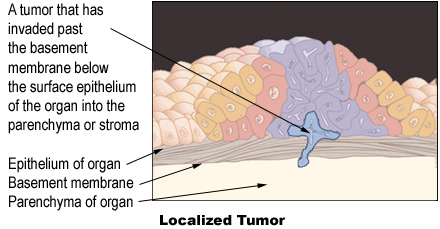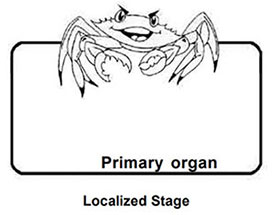Code 1: Localized
- Malignancy limited to organ of origin
- Can be widely invasive or have spread within the organ of origin
- Basement membrane has been invaded
- No spread beyond boundaries of the organ
The illustration below shows a tumor that has invaded past the basement membrane below the surface epithelium of the organ into the parenchyma or stroma.

Figure 1. Localized tumor.
Source: Adapted from an illustration by Brian Shellito of Scientific American, as printed in Cancer in Michigan, The Detroit News, Nov. 1-2, 1998.
It is important to know and recognize the names of different structures within the organ (such as lamina propria, myometrium, muscularis propria, for example) so that a description of invasion or involvement of these structures will not be interpreted as regional spread.
If the pathology reports, operative reports and other investigations show no evidence of spread, the tumor may be assumed to be localized (if in situ disease has been eliminated as possibility).

Figure 2. Localized stage.
Source: Young JL Jr, Roffers SD, Ries LAG, Fritz AG, Hurlbut AA (eds). SEER Summary Staging Manual - 2000: Codes and Coding Instructions, National Cancer Institute, NIH Pub. No. 01-4969, Bethesda, MD, 2001.
Updated: November 5, 2024
Suggested Citation
SEER Training Modules: Code 1: Localized. U.S. National Institutes of Health, National Cancer Institute. Cited 27 February 2026. Available from: https://training.seer.cancer.gov.




